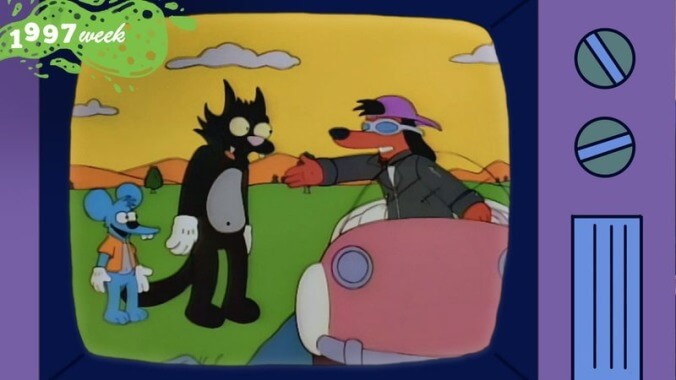“The Itchy & Scratchy & Poochie Show” gave us a totally outrageous paradigm


Once in a great while, we are privileged to experience a television event so extraordinary, it becomes part of our shared heritage. And in receiving these gifts, by grace of our noble human character, we are given license to say, eh, they’re not so great, then begin nitpicking the shit out of them. Such is our passionate, prickly relationship with television (teacher, mother, secret lover) and with pop culture as a whole: Ardor becomes ownership, familiarity breeds contempt, and the things that entertain us, enrage us when they have the audacity to change—or worse, when they stay exactly the same for long enough that it just gets stale. And rest assured that, when they do, we are on the internet within minutes, registering our disgust throughout the world.
As it has so many things, The Simpsons gave us an entire vocabulary to talk about this uneasy dance, and remarkably, it did it with a single episode. “The Itchy & Scratchy & Poochie Show” premiered on February 9, 1997, but chances are (especially if you’re an A.V. Club reader), you’ve heard a line quoted or concept referenced nearly every day in the 20 years since. There are lots of Simpsons quotes applicable to almost any situation, of course, no matter how narrowly defined; with 600-plus episodes of dialogue banked, the show is practically nearing the sentience of any sophisticated artificial intelligence, and may soon be able to respond fluidly to anything you throw at it. But it’s amazing how endlessly adaptable “Poochie” has been, specifically, particularly within the realm of pop culture (which is, after all, the only place where you and I exist).
It’s even more amazing, then, to consider that “Poochie” was The Simpsons’ bluntest commentary on the anxiety over its fading relevance. Prior to the show’s eighth season—where “Poochie” would put it over The Flintstones’ record for longest-running prime-time cartoon—Fox executives, who apparently never saw The Flintstones’ “Great Gazoo” episodes, suggested that Simpsons producers create a new character, one who would move in with the family permanently and really shake things up. In response, the show once more turned to Itchy & Scratchy, frequent outlet for all its industry inside jokes, and proceeded to ruin the “Cousin Oliver” trope for good. In fact, The Brady Bunch’s train-wrecking towheaded tyke has almost entirely been supplanted in the go-to reference book by The Simpsons’ passive-aggressive invention, Poochie The Rockin’ Dog.
Yet “Poochie” endures because it satirizes not just those TV conventions, but the entire process by which art is manufactured, consumed, and shat upon. In doing so, it’s given us so many ways to express distaste for the rote unoriginality of it all, mostly by recycling lines from a 20-year-old show. Has there even been a more apt summary of the desperate attempts to chase and monetize “cool” than the scene where executives urge the Itchy & Scratchy team (modeled after The Simpsons staff) to give them a dog “who gets ‘biz-zay!’ Consistently and thoroughly”? Or of all the self-indulgent wheel-spinning that pads out many a superhero blockbuster or prestige drama series than “When are they going to get to the fireworks factory?!” Or of the clumsy yet gratifying exit of an obnoxious character, whether fictional or real, than “Poochie died on the way back to his home planet?” Judging by the comments around here, no.
Although it’s cynical about the ends, “Poochie” also fosters some genuine sympathy for those stuck figuring out the means. The Itchy & Scratchy staff dutifully plows ahead on figuring out how to “rasta-fy him by 10 percent or so,” knowing that questioning the executives’ meaningless buzzwords will only get them fired. Meanwhile, Roger Meyers Jr. is forced to figure out how to make his cartoon more appealing to fickle yet demanding—and stupid—viewers who “want a realistic, down-to-earth show… that’s completely off-the-wall and swarming with magic robots.” Caught in the middle are people like voice actor June Bellamy (an affectionate stand-in for the late June Foray) and Homer himself, who just wants to please the audience and “make them laugh and cry until we grow old together.” It’s a tricky balance to acknowledge that behind every “soulless by-product of committee thinking,” there are also people with actual dreams and good, artistic intentions without coming off as mawkish or condescending. “Poochie” manages to engender a twinge of compassion for all involved, even if they’re uniting behind a rapping dog.
Still, the episode’s most lasting contribution to our pop cultural dialogue is in its portrayal of the people who receive these noble, if understandably flawed creations, then ruthlessly tear them apart. By 1997, The Simpsons wasn’t just facing criticism from professional critic types who were waiting impatiently, like Kent Brockman says here, “for cracks to appear in the show’s hilarious façade.” It was also in the early stages of its tense alliance with the internet—primarily through the dedicated denizens of the alt.tv.simpsons newsgroup, whose users had already spent most of the show’s run pointing out errors in consistency and offering hyperbolic, knee-jerk raves or pans, all in order to delude themselves into thinking that they were part of the show. Guys like this fucking nerd:
Yes, as an 18-year-old technical man who spent all his time watching a kids’ cartoon show, then arguing with strangers about the “Best Nelson Lines,” I was quite evidently thrilled to see my efforts finally get some recognition here in the form of those pathetic dorks who hassle Homer and June about magic xylophones. My excitement was shared by my fellow geniuses at work (most of them, anyway), who similarly loved that The Simpsons writers were calling us—us!—annoying asshats. They really do care!
That sort of codependent, love-hate relationship existed between artist and audience long before the internet, of course. But “Poochie” presciently captured the way recaps, comment boards, live-tweeting, and all the other modern facets of online fandom in early bloom would soon multiply and embolden those angry nerds, and give them even more direct ways to vent their frustrations. And it offered a succinct satirical commentary on that already festering sense of entitlement in this oft-cited exchange between Bart and Comic Book Guy:
Comic Book Guy: Last night’s Itchy & Scratchy was, without a doubt, the worst episode ever. Rest assured I was on the internet within minutes registering my disgust throughout the world.
Bart: Hey, I know it wasn’t great, but what right do you have to complain?
Comic Book Guy: As a loyal viewer, I feel they owe me.
Bart: What? They’re giving you thousands of hours of entertainment for free. What could they possibly owe you? If anything, you owe them.
Comic Book Guy: …Worst episode ever.
I nearly lost it, A+, etc. etc.
Of course, the irony of “The Itchy & Scratchy & Poochie Show” is that, at eight seasons, The Simpsons was really only beginning to plumb the depths of how show business is, to paraphrase George Burns, a hideous bitch-goddess. The writers continued to address, sarcastically, those fan fears of creative bankruptcy just a few months later with “The Simpsons Spin-Off Showcase.” But by season 10, the joke was far less funny. The Simpsons really was seeing a decline in quality, marked by episodes built around wacky detours and conspicuous celebrity guests who may as well have been rappin’ surfer dogs from Gangster City. Increasingly, the arguments offered by “Poochie”—hey, everything loses its impact over time; you’re getting this stuff for free; if you don’t like it anymore, change the channel; whaddaya want from us?—started to feel more and more like the show claiming a moral superiority that preemptively absolved it from any criticism.
Meanwhile, whatever détente was briefly achieved by the writers talking directly to those “hardcore fans”—lampooning them as awkward nerds who call for them to be fired over petty grievances, then lecturing them on how they’re getting this huge, edifying part of their lives for nothing—well, that certainly didn’t ameliorate their critiques. (Look: The very next episode, this fucking dork was right back to complaining.) Over the years, their grumbles only got more intense and all-encompassing, to where “Worst. Episode. Ever.” barely begins to cover it. And eventually, the writers just established a bulwark of steadfast, shrugging defensiveness, chalking up the annual deluge of “The Simpsons sucks now” to those hardcore fans being bitterly set in their ways, yet somehow unable to just leave the show alone.
Nevertheless, “Poochie” remains a landmark episode of television—a landmark work of art, period—for even attempting to have that awkward conversation, and for doing it in a way that even the people it insulted for caring could laugh at. Granted, there are probably some who still find “Poochie” kind of ungracious or galling (there were definitely some on the ’97 newsgroups who felt that way). And for all its directness, there’s actually no clear message to walk away with here: Are the creators at fault for coasting on inertia or for allowing their integrity to be compromised? Or are the fans at fault for expecting too much and being impossible to please? It’s both, it seems to say; let’s none of us have a cow. But then, this is an endlessly renewable debate. At the very least, “Poochie” gave us all a language to discuss it—to the EXTREME.